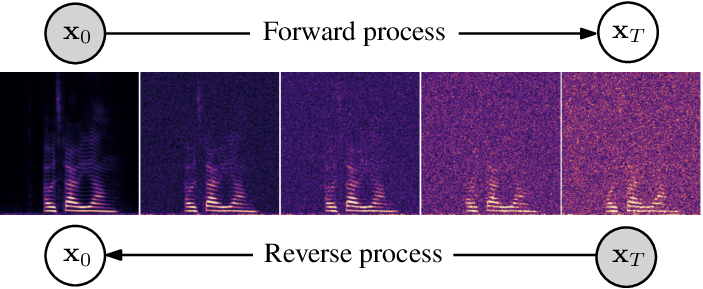This repository contains the official PyTorch implementations for the 2022 papers:
- Simon Welker, Julius Richter, Timo Gerkmann. "Speech Enhancement with Score-Based Generative Models in the Complex STFT Domain", ISCA Interspeech, Incheon, Korea, Sep. 2022. [bibtex]
- Julius Richter, Simon Welker, Jean-Marie Lemercier, Bunlong Lay, Timo Gerkmann. "Speech Enhancement and Dereverberation with Diffusion-Based Generative Models", arXiv preprint arXiv:2208.05830, 2022. [bibtex]
Audio examples and further supplementary materials are available on our project page.
- Create a new virtual environment with Python 3.8 (we have not tested other Python versions, but they may work).
- Install the package dependencies via
pip install -r requirements.txt. - If using W&B logging (default):
- Set up a wandb.ai account
- Log in via
wandb loginbefore running our code.
- If not using W&B logging:
- Pass the option
--no_wandbtotrain.py. - Your logs will be stored as local TensorBoard logs. Run
tensorboard --logdir logs/to see them.
- Pass the option
- For the Speech Enhancement task, we provide pretrained checkpoints for the models trained on VoiceBank-DEMAND and WSJ0-CHiME3, as in the paper. They can be downloaded here.
- For the Dereverberation task, we provide a checkpoint trained on our WSJ0-REVERB dataset. It can be downloaded here.
- Note that this checkpoint works better with sampler settings
--N 50 --snr 0.33.
- Note that this checkpoint works better with sampler settings
Usage:
- For resuming training, you can use the
--resume_from_checkpointoption oftrain.py. - For evaluating these checkpoints, use the
--ckptoption ofenhancement.py(see section Evaluation below).
Training is done by executing train.py. A minimal running example with default settings (as in our paper [2]) can be run with
python train.py --base_dir <your_base_dir>where your_base_dir should be a path to a folder containing subdirectories train/ and valid/ (optionally test/ as well). Each subdirectory must itself have two subdirectories clean/ and noisy/, with the same filenames present in both. We currently only support training with .wav files.
To see all available training options, run python train.py --help. Note that the available options for the SDE and the backbone network change depending on which SDE and backbone you use. These can be set through the --sde and --backbone options.
Note:
- Our journal preprint [2] uses
--backbone ncsnpp. - Our Interspeech paper [1] uses
--backbone dcunet. You need to pass--n_fft 512to make it work.- Also note that the default parameters for the spectrogram transformation in this repository are slightly different from the ones listed in the first (Interspeech) paper (
--spec_factor 0.15rather than--spec_factor 0.333), but we've found the value in this repository to generally perform better for both models [1] and [2].
- Also note that the default parameters for the spectrogram transformation in this repository are slightly different from the ones listed in the first (Interspeech) paper (
To evaluate on a test set, run
python enhancement.py --test_dir <your_test_dir> --enhanced_dir <your_enhanced_dir> --ckpt <path_to_model_checkpoint>to generate the enhanced .wav files, and subsequently run
python calc_metrics.py --test_dir <your_test_dir> --enhanced_dir <your_enhanced_dir>to calculate and output the instrumental metrics.
Both scripts should receive the same --test_dir and --enhanced_dir parameters. The --cpkt parameter of enhancement.py should be the path to a trained model checkpoint, as stored by the logger in logs/.
We kindly ask you to cite our papers in your publication when using any of our research or code:
@inproceedings{welker22speech,
author={Simon Welker and Julius Richter and Timo Gerkmann},
title={Speech Enhancement with Score-Based Generative Models in the Complex {STFT} Domain},
year={2022},
booktitle={Proc. Interspeech 2022},
pages={2928--2932},
doi={10.21437/Interspeech.2022-10653}
}@article{richter2022speech,
title={Speech Enhancement and Dereverberation with Diffusion-based Generative Models},
author={Richter, Julius and Welker, Simon and Lemercier, Jean-Marie and Lay, Bunlong and Gerkmann, Timo},
journal={arXiv preprint arXiv:2208.05830},
year={2022}
}[1] Simon Welker, Julius Richter, Timo Gerkmann. "Speech Enhancement with Score-Based Generative Models in the Complex STFT Domain", ISCA Interspeech, Incheon, Korea, Sep. 2022.
[2] Julius Richter, Simon Welker, Jean-Marie Lemercier, Bunlong Lay, Timo Gerkmann. "Speech Enhancement and Dereverberation with Diffusion-Based Generative Models", arXiv preprint arXiv:2208.05830, 2022.
The paper [2] has been submitted to a journal and is currently under review. The appropriate citation for it may therefore change in the future.
